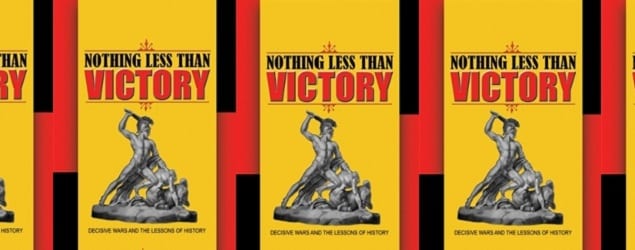Israel’s PM Reading John David Lewis’s Nothing Less Than Victory

Lately we’ve seen a whole flurry of articles — many of them overstated — about the influence of Ayn Rand on some of Trump’s cabinet picks, and in that there’s some (qualified) good news. Now comes this heartening news story: Israel’s newspaper of record, Haaretz, reports that the country’s prime minister, Benjamin Netanyahu, was seen in parliament reading a book by an Objectivist historian, the late John David Lewis. The book is Nothing Less Than Victory: Decisive Wars and the Lessons of History (Princeton University Press, 2010).
John’s excellent book argues that “the goal of war is to defeat the enemy’s will to fight,” and shows “that aggressive, strategic military offenses can win wars and establish lasting peace, while defensive maneuvers have often led to prolonged carnage, indecision, and stalemate.” There are many lessons in it for world leaders — especially Netanyahu’s team, which ought to re-think its approach. How many of the book’s insights will leave an impression on his thinking? Well, it’s wonderful that he’s reading Nothing Less than Victory, and time will tell what influence it has on his views.
My reaction to this news story is deeply personal. John was a friend of longstanding and a colleague. I learned a lot from conversations with him and from reading his work. Moreover, he was an unusually courageous individual, and I admired how he confronted the challenges he met along his path in life and in his career.
John passed away five years ago next month. He would have been delighted (I’m sure) to hear that Netanyahu was reading his book.
For me the story about Netanyahu, like the coverage of the Rand factor in the Trump cabinet, is another illustration of the importance of ARI’s mission. We work to tell people about Ayn Rand’s philosophy and to underscore its real-world value in the life of an individual and a culture. Rand’s novels and non-fiction books — which we encourage people to read through various programs — are central. So is teaching about her philosophy of Objectivism (see: ARI’s Objectivist Academic Center and ARI Campus). So are substantive explorations from an Objectivist outlook of cultural-political issues (see for example: Equal Is Unfair; Winning the Unwinnable War; Defending Free Speech). These are all means by which ARI works to bring about widespread awareness and understanding of Objectivism into the culture.
I know that John was committed to ARI’s mission, and in his own work, he contributed a great deal to it.
(Originally published on Times of Israel.)



